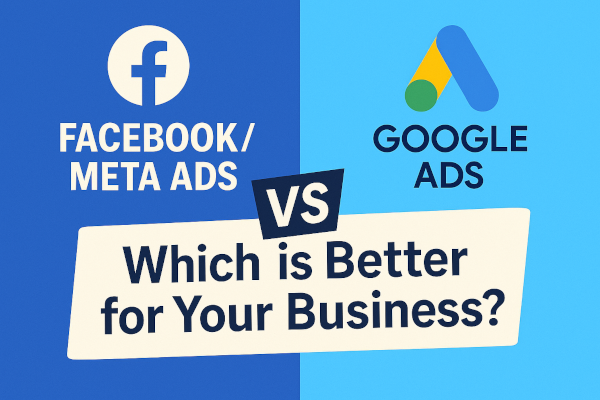Choosing between Facebook/Meta Ads and Google Ads is a critical decision for any business aiming to thrive online. Both platforms dominate the digital advertising world, yet they serve very different purposes. Whether you’re a small business owner, a startup founder, or a marketing pro, understanding their unique strengths can mean the difference between wasted ad spend and winning results. In this post, we’ll break down the key differences, benefits, and use cases so you can decide which platform best aligns with your business goals.
🎯 Targeting Capabilities
🧠 Facebook/Meta Ads: Audience Intelligence
Facebook (now Meta) is built on deep user data. It allows advertisers to target users based on:
- Demographics: Age, gender, education, relationship status
- Interests: Hobbies, entertainment, fitness, and more
- Behavior: Purchase habits, device usage, travel patterns
Meta’s Lookalike Audiences and Custom Audiences help you expand your reach with high precision.
🔍 Google Ads: Intent-Based Targeting
Google Ads, on the other hand, captures user intent. When someone types a search like “buy hiking shoes,” they’re ready to take action. Google lets you target:
- Keywords: Match ads to specific search terms
- Location & Device: Local businesses thrive with geo-targeting
- Audiences: Includes in-market, affinity, and custom intent segments
✅ Best For: Businesses looking to capture high-intent customers at the moment of search.
💰 Cost & ROI Comparison
💸 Facebook/Meta Ads: Lower CPC but Higher Funnel
Facebook Ads typically have lower cost-per-click (CPC), often under $1, but target users earlier in the funnel. That means they may take longer to convert.
💼 Google Ads: Higher CPC but Stronger Buyer Intent
Google Ads usually cost more (CPC ranging from $1–$10 or more depending on competition), but the users are often ready to buy.
Return on Investment (ROI):
- Facebook excels at brand awareness and lead generation
- Google dominates direct-response and eCommerce conversions
📊 Pro Tip: Use Facebook for nurturing and brand building, Google for conversions and sales.
🛠️ Ad Formats & Creative Flexibility
🎨 Meta Ads: Visually Rich & Engaging
Facebook and Instagram offer visually immersive formats:
- Carousel, Stories, Reels, Instant Experiences
- Ideal for product demos, lifestyle branding, and storytelling
🖼 Google Ads: Text & Search Focused
While Google Search ads are text-based, its Display Network and YouTube Ads add rich visuals to the mix:
- Responsive Display Ads, Shopping Ads, Video Ads
🆚 Verdict: Facebook wins on visual engagement. Google wins on direct response ads.
📈 Conversion Tracking & Analytics
📲 Facebook Ads Manager: Great for Funnel Tracking
It allows you to see user journeys, especially across Meta platforms. With Meta Pixel, you can measure actions on your website.
📊 Google Ads + Analytics: Data Powerhouse
Google integrates seamlessly with Google Analytics, offering deeper insights and conversion tracking across search, web, and mobile.
🚀 Best For: Data-driven marketers who want to analyze every click, bounce, and purchase.
🔁 Use Cases: What Works Best Where?
| Goal | Go With Facebook Ads | Go With Google Ads |
|---|---|---|
| Brand Awareness | ✅ Yes | ⚠️ Moderate |
| Lead Generation | ✅ Yes (with forms) | ✅ Yes |
| eCommerce / Product Sales | ✅ Yes (especially Instagram) | ✅✅ Yes (especially Shopping Ads) |
| Local Business Promotion | ✅ Yes (location targeting) | ✅✅ Yes (Google Maps, local search) |
| High-Intent Conversions | ⚠️ May take longer | ✅✅ Perfect fit |
🧠 Final Thoughts: Which Should You Choose?
There’s no one-size-fits-all answer. The choice between Facebook/Meta Ads vs Google Ads depends on your business stage, goals, and budget:
- Use Google Ads if you want to target people actively searching for your product or service. Great for high-intent sales and leads.
- Use Facebook/Meta Ads to build brand awareness, generate interest, and retarget users through engaging visual content.
💡 Pro Strategy: Combine both platforms—use Facebook to warm up audiences and Google to convert them. It’s a powerhouse digital marketing funnel when used together.
Have you used Facebook Ads, Google Ads, or both? What worked for your business? Share your experience in the comments below, and let’s learn from each other!
